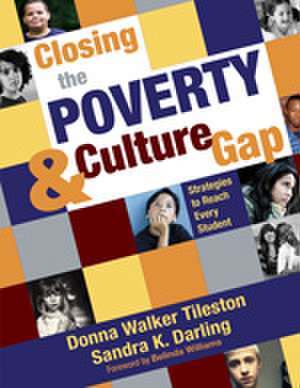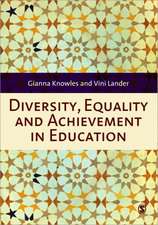Closing the Poverty and Culture Gap: Strategies to Reach Every Student
Editat de Donna E. Walker Tileston, Sandra K. Darlingen Limba Engleză Paperback – 2 iun 2009
University of North Carolina at Charlotte
'Provides a rich collection of research for instructional strategies. The combination of a call to action and supporting strategies provides a tool kit for instructional leaders' — Mary Reeve, Director, Services for Exceptional Students
Gallup McKinley County Schools, NM
Many caring teachers have expressed a need for more help in improving student achievement, especially in low-performing/high-poverty schools. This research-based book offers a comprehensive set of instructional strategies that have been proven to make a significant difference in student learning when diverse cultures and poverty come into play.
Donna Walker Tileston and Sandra K. Darling provide a six-part framework to help teachers build on students' assets and strengths rather than attempt to overcome perceived disadvantages. Based on their extensive experience and gathered data, the authors discuss:
- Why some cultures are "turned off" by typical motivational approaches and what educators can do to reach students
- What research says about the brain's desire to learn
- How teachers can build on students' prior knowledge and help forge new connections
- The importance of resiliency, especially for students of poverty and diverse cultures
- Teaching procedural and declarative knowledge and preparing students for high-stakes tests
This practical resource provides the key structures for working effectively with students of differing cultures and poverty, ensuring higher student achievement in the diverse classroom.
Preț: 215.47 lei
Nou
Puncte Express: 323
Preț estimativ în valută:
41.25€ • 42.88$ • 34.20£
41.25€ • 42.88$ • 34.20£
Carte tipărită la comandă
Livrare economică 05-19 februarie 25
Preluare comenzi: 021 569.72.76
Specificații
ISBN-13: 9781412955317
ISBN-10: 1412955319
Pagini: 120
Dimensiuni: 216 x 279 x 8 mm
Greutate: 0.34 kg
Ediția:1
Editura: SAGE Publications
Colecția Corwin
Locul publicării:Thousand Oaks, United States
ISBN-10: 1412955319
Pagini: 120
Dimensiuni: 216 x 279 x 8 mm
Greutate: 0.34 kg
Ediția:1
Editura: SAGE Publications
Colecția Corwin
Locul publicării:Thousand Oaks, United States
Recenzii
"I can get future teachers to appreciate the role of culture and poverty, but it is very hard for them to translate that understanding into specific activities or strategies. This book provides strategies and supporting information about how and why culture and poverty are important. It provides so much more than any other text that I have ever used in an Introduction to Education course regarding working with diverse populations."
"Provides a rich collection of research for instructional strategies. The combination of a call to action and supporting strategies provides a tool kit for instructional leaders."
"Provides a rich collection of research for instructional strategies. The combination of a call to action and supporting strategies provides a tool kit for instructional leaders."
Cuprins
Foreword by Belinda Williams
Acknowledgments
About the Authors
Introduction
1. Culture and Poverty
2. Motivation From Within
3. Resiliency: Why It Matters
4. Teaching Declarative Knowledge
5. Teaching Procedural Knowledge (or Process)
6. The Role of Leadership in the Poverty School
7. Closing the Achievement Gaps
References
Index
Acknowledgments
About the Authors
Introduction
1. Culture and Poverty
2. Motivation From Within
3. Resiliency: Why It Matters
4. Teaching Declarative Knowledge
5. Teaching Procedural Knowledge (or Process)
6. The Role of Leadership in the Poverty School
7. Closing the Achievement Gaps
References
Index
Descriere
Use instructional practices that lead students of poverty and diverse cultures to success!
Donna Walker Tileston and Sandra K. Darling provide instructional strategies to help teachers improve learning in students of diverse cultures and poverty. This research-based book presents a six-part framework that builds on students’ assets and strengths. The authors discuss:
Donna Walker Tileston and Sandra K. Darling provide instructional strategies to help teachers improve learning in students of diverse cultures and poverty. This research-based book presents a six-part framework that builds on students’ assets and strengths. The authors discuss:
- Why some cultures are “turned off” by typical motivational approaches and what educators can do to reach students
- What research says about the brain’s desire to learn
- How teachers can build on students’ prior knowledge
- The importance of resiliency
- Teaching procedural and declarative knowledge and preparing students for tests






